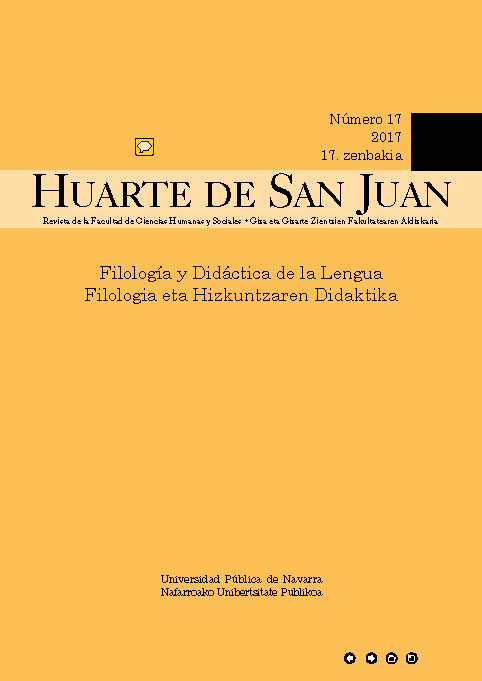Activation activities as a catalyst for increased rates of vocabulary and grammar learning
Palabras clave:
Activación, ILE, vocabulario, gramática, motivaciónResumen
La activación o acceso a conocimientos previos parece esencial para promover un aprendizaje significativo. Este estudio analiza los efectos de la activación de conocimientos previos en vocabulario y gramática en hablantes de ILE de secundaria. Con un diseño pre-post-prueba, se comparó el desempeño de un grupo experimental que había trabajado con actividades de activación del vocabulario y la gramática durante 10 sesiones con un grupo de control paralelo. Los datos analizados se obtuvieron de: (1) una pre y post-prueba de vocabulario y gramática; (2) un pre-post-examen de la unidad del libro de texto; (3) un cuestionario de satisfacción post tratamiento. Los análisis confirmaron los beneficios de la activación puesto que el alumnado experimental produjo más ítems léxicos y obtuvo mejor puntuación en todas las pruebas. Asimismo, los resultados de los ejercicios gramaticales sugieren beneficios para el aprendizaje gramatical. Además, el grupo experimental mostró una actitud positiva y expresaron sus deseos de continuar con las actividades.
Descargas
Citas
Cambridge University Press (2010): Placement Test <http://www2.klett.de>.
Coyle, D. (2007): «Content and Language Integrated Learning: Towards a Connect-ed Research Agenda for CLIL pedagogies», The International Journal of Bilingual Education and Bilingualism, nº 10, pp. 543-562. Doi: https://doi.org/10.2167/beb459.0.
Cummins, J. (1984): Bilingualism and special education: Issues in assessment and pedago-gy. Clevedon, Multilingual Matters.
Dale, L. & Tanner, R. (2012): CLIL Activities – A resource for subject and language teachers, Cambridge, Cambridge University Press.
Dale, L., Van der Es, W. & Tanner, R. (2010): CLIL skills, Harlem, European Platform, Universidad de Leiden.
Dochy, F., Segers, M. & Buehl, M. M. (1999): «The relation between assessment practices and outcomes of studies: the case of research on prior knowledge», Review of Educational Research, nº 69 (2), pp. 145-186, <http://journals.sagepub.com/doi/pdf/10.3102/00346543069002145>.
Dole, J. A., Valencia, S. W., Greer, E. A. & Wardrop, J. L. (1991): «Effects of two types of prereading instruction on the comprehension of narrative and exposi-tory text», Reading Research Quarterly, nº 26 (2), pp. 142-159. Doi: http://dx.doi.org/10.2307/747979
Evans, V. & Dooley, J. (2010): Spark 2, Berkshire, Express Publishing.
Ferris, D. R. (2011): Treatment of Error in Second Language Student Writing, Michigan, University of Michigan Press.
García Mayo, M. P. & Villarreal, I. (2011): «The development of suppletive and affixal tense and agreement morphemes in the L3 English of Basque-Spanish bilinguals», Second Language Research, nº 27, pp. 129-149. Doi: 10.1177/0267658310386523
Graves, M. F., Cooke, C. L. & Laberge, M. J. (1983): «Effects of previewing difficult short stories on low ability junior high school students’ comprehension, recall, and attitudes», Reading Research Quarterly, n.º 18 (3), pp. 262-276. Doi: http://dx.doi.org/10.2307/747388
Langer, J. A. (1984): «Examining background knowledge and text comprehension», Reading Research Quarterly, nº 19(4), pp. 468-481. Doi: 10.2307/747918
Long, S. A., Winograd, P. N. & Bridget, C. A. (1989): «The effects of reader and text characteristics on imagery reported during and after reading», Reading Research Quarterly, nº 24(3), pp. 353-372. Doi: 10.2307/747774
Maghsoudi, N. (2012): «The Impact of Schema Activation on Reading Comprehen-sion of Cultural Texts Among Iranian EFL Learners», Canadian Social Science, nº 8(5), pp. 196-201, <http://www.cscanada.net/index.php/css/article/view/j.css.1923669720120805.3131>.
Majid Hayati, A. (2009): «The Impact of Cultural Knowledge on Listening Comprehension of EFL Learners», English Language Teaching, nº 2 (3), pp. 145-152. Doi: http://dx.doi.org/10.5539/elt.v2n3p144
Marsh, D. (2002): CLIL/EMILE – The European Dimension: Actions, Trends and Fore-sight Potential, Brussels, the European Union.
McKeown, M. G., Beck, I. L., Sinatra, G. M. & Loxterman, J. A. (1992): «The relative contribution of prior knowledge and coherent text to comprehension», Reading Research Quarterly, nº 27(1), pp. 78-93, <https://files.eric.ed.gov/fulltext/ED330991.pdf>.
Mehisto, P., Marsh, D. & Frigols, M. (2008): Uncovering CLIL: Content and Language Integrated Learning in Bilingual and Multilingual Education. Oxford, Macmillan.
Nakata, Y. (2006): Motivation and Experience in Foreign Language Learning. Oxford, Peter Lang.
Prieto, A. & Bueno, M. C. (2015): «The influence of socio-economic background, personal effort and motivation on English proficiency», Huarte de San Juan. Filología y Didáctica de la Lengua, nº 15, pp. 43-65, <http://academica-e.unavarra.es/handle/2454/20371>.
Roozkhon, M. & Rahmani Samani, E. (2013): «The Effect of Using Anticipation Guide Strategy on Iranian EFL Learners’ Comprehension of Culturally Un-familiar Texts», Mediterranean Journal of Social Sciences, nº 4(6), pp. 127-140. Doi: 10.5901/mjss.2013.v4n6p127
Shabani, M. (2013): «The Effect of Background Knowledge on Speaking Ability of Iranian EFL Learners», International SAMANM Journal of Marketing and Manage-ment», nº 1(1), pp. 25-33, <http://www.samanmjournals.org/wp-content/uploads/The-Effect-of-Background-Knowledge-on-Speaking-Ability-of-Iranian-EFL-Learners1.pdf>.
Shamla, K. (2010): The Effectiveness of a Suggested Program Based on Prior Knowledge to Develop Eighth Graders’ English Reading Comprehension Skills, The Islamic University of Gaza, <http://library.iugaza.edu.ps>.
Stevens, K. C. (1980): «The effect of background knowledge on the reading comprehension of ninth graders», Journal of Reading Behavior, nº 12(2), pp. 151-154. Doi: 10.1080/10862968009547365
Stevens, K. C. (1982): «Can we improve reading by teaching background infor-mation?», Journal of Reading, nº enero, pp. 326-329, <http://www.jstor.org/sta-ble/40030380>.
Strangman, N. & Hall, T. (2004): Background Knowledge: Curriculum Enhancement Report, Wakefield, NCAC, <http://aim.cast.org>.
Tobias, S. (1994): «Interest, prior knowledge, and learning», Review of Educational Research, nº 64(1), pp. 37-54. Doi: https://doi.org/10.3102/00346543064001037
Villarreal, I. (2011): Tense and Agreement in the Non-Native English of Basque-Spanish Bilinguals: Content and Language Integrated Learners vs. English as a School Subject Learners, Bilbao, Universidad del País Vasco. Doi: 10.13140/RG.2.2.25460.96644.
Zenotz, M. V. (2012): «Motivación en el aprendizaje de lenguas: estado de la cuestión», Huarte de San Juan. Filología y Didáctica de la Lengua, nº 12(1), pp. 75-81, <https://academica-e.unavarra.es/handle/2454/9359>.
Descargas
Publicado
Cómo citar
Número
Sección
Licencia
Todos los artículos son publicados bajo una licencia de uso y distribución Creative Commons (BY-NC-ND 4.0). A cada artículo se le asignará un identificador DOI.
Los autores conservan los derechos de autor y conceden a la revista el derecho de la primera publicación. Los autores podrán establecer acuerdos adicionales para la distribución no exclusiva de la versión de la obra publicada en la revista (por ejemplo, situarlo en un repositorio institucional), con un reconocimiento de su publicación inicial en esta revista. Los trabajos podrán subirse a repositorios institucionales inmediatamente tras la publicación de la revista.
Asimismo, se permite y se anima a los autores a difundir sus trabajos electrónicamente (por ejemplo, en repositorios institucionales, redes sociales académicas o en su propio sitio web).







